I have personally read every book in this list. The enormous value I’ve gotten out of these books is the sole reason I am recommending them. These books helped me to make my Swift To-Do List very successful. There are no affiliate links in this post. If you have suggestions for other books that would benefit people in software business, please post them in comments, and I will update the additional list at the end.
There are both new and old books in this list. For the naysayers: Don’t forget how easy it is to succumb to hype and to phrases like “anything older than 3 months is irrelevant”, “it’s the age of the app”, “desktop is dead”, and so on. That’s simply not true. Reading these books can be very beneficial for you and for your business. The concepts are still valid, the ideas can be still utilized. Even if the world has fatalistically moved on (and it hasn’t), you can’t catch it up without a strong foundation. Many things are cyclical or ageless. You can re-combine ideas, find patterns, get inspired and most importantly, learn new things. These books are a nourishment for your mind. And hey, it can’t hurt to read something different than you are used to read!
The books are ordered randomly; it would be nearly impossible to come with a satisfying ranking. Apples and pears, you know.
Writing this post took me 5 hours (plus 5 years to find and read the books). Enjoy.
- Dreaming In Code (Scott Rosenberg) – The definitive lessons about over-ambitiousness and idealism in software. True story about spectacular software failure. Dream team, dream budget, and a undreamed-of failure. Reads like a novel. The subtitle of the book is “Two Dozen Programmers, Three Years, 4,732 Bugs, and One Quest for Transcendent Software”.
- Peopleware: Productive Projects and Teams (Tom DeMarco and Timothy Lister) – Are you sure you are not chasing marginal productivity gains while the fundamentals are eluding you? Also, chances are, you are not working alone. If you have not read this yet, then better start whistling and go secretly read it under a blanket with a flash light.
- Startups Open Sourced: Stories to inspire and educate (Jared Tame) – Entertaining read. Not immediately actionable, but definitely worthwhile. Even if you have a mature business, the fresh look from the startup perspective can give you some ideas what you might improve upon. Interesting tidbit – reddit founders used to create hundreds of fake user accounts, submissions and comments to get their site started. Kindle edition is listed separately.
- GUI Bloopers 2.0 (Jeff Johnson PhD) – If you think your GUI design could use some improvement, read this. It even includes images! ;-) Negative examples are not only useful, but also fun, and they give you warm fuzzy feeling that your GUI is better. Or is it…? Some of the bloopers reminded me of Interface Hall of Shame.
- The Elements of Style – You write a lot of text. This will help you write it better. Your code, writing for web, blog, emails – all that is text. (The book is public domain now.)
- In Search of Stupidity (Merril R. Chapman) – The subtitle of this book is “Over Twenty Years of High Tech Marketing Disasters”. It’s fun to read because it’s about failures. It will make you feel good, because you are not failing on such a huge scale. But do not be deceived by that false positive feeling – unless you are not failing at least a bit, you are not experimenting enough, which is a failure by itself. Even giants like Google are constantly scraping ambitious projects because they simply didn’t work out.
- Do More Faster: TechStars Lessons to Accelerate Your Startup (Brad Feld and David Cohen) – Similar to Startups Open Sourced, basically stories of new startups that were supported by TechStars startup accelerator (which is similar to Paul Graham’s Y-Combinator).
- Content Rules (Ann Handley, C.C. Chapman) – A must read. And if you are struggling to grow your businesses to a certain extent, chances are, this book will tell you exactly how to do that.
- Code Complete – In case you have not worked in any software company or team, but just on your own, your code will be probably greatly enhanced once you implement the ideas presented in this awesome book. Many developers swear by it; it’s their bible.
- Maximum Achievement (Brian Tracy) – There is not much self-help books that I would readily recommend to mISVs. However, Maximum Achievement will help you to live up to your potential, and that has significant impact on your bottom-line.
- Founders At Work (Jessica Livingston) – Inspirational and motivational read. Not immediately actionable, but might make you excited again about the fact that you are are in software business.
- Blue Ocean Strategy – If you are feeling like innovating, or feel stuck with your current market positioning or product/services portfolio, read this. The subtitle of this book is “How to Create Uncontested Market Space and Make Competition Irrelevant”. It is written by example – lots of cool stories. The stories clearly tell how important is the presentation of your products/services.
- Hackers & Painters (Paul Graham) – Really great stuff (that you’ve probably already read). Paul is excellent essayist, and has some refreshing insights. If you don’t know Paul Graham, he is the founder of Y-Combinator. All his essays are also freely available on his website. The book includes only some of them. My favorite essays are How to Make Wealth and Why Nerds are Unpopular.
- Joel On Software (Joel Spolsky) – Joel is my hero. Joel is a spectacular pragmatist and software business owner with deep knowledge of Microsoft technologies. This book will bring you loads of ideas to improve your business, and will definitely change your views on many things related to technology, Microsoft, development and software business.
- More Joel On Software (Joel Spolsky) – Same as above. Really, you can’t get enough of this stuff.
- Best Software Writing (Joel Spolsky) – That’s right, Joel now occupies 10% of these 30 books.
- Outliers (Malcom Gladwell) – Ever wondered why is Bill Gates so successful?
- Eric Sink On The Business Of Software – This is a classic book from a man who coined the term “Micro-ISV”. Everyone in the TBoS community knows the book. You’ve probably already read it; if not, you can still pick a thing or two out of it.
- Words That Sell (Richard Bayan) – If you do your own copywriting, this book will save you hours of work, help you quickly overcome writer’s blocks, and enable you to create texts that you will finally feel proud about. Just don’t overdo it with the buzz words ;-)
- The Pragmatic Programmer (Andrew Hunt and David Thomas) – Another classic full of great guidelines and principles related to programming. For example, if it has never occurred to you that it is fairly easy to write code that writes code, and you could probably utilize that in your own projects with great success right now, then this book is a must read for you.
- The E-Myth Revisited (Michael E. Gerber) – At first, the principles presented in this book might seem not much applicable to mISVs, but if you switch the word “employee” for “script”, the book gets whole new (and useful) perspective.
- The Business Of Software (Michael. A Cusumano) – Another (perhaps outdated) classic. Read it, it’s well worth the time only if to gain some structured thinking about (your) software business.
- Anything You Want (Derek Sivers) – Useful for gaining high-level perspective. Reminder that there is more than money in business (and life).
- Permission Marketing (Seth Godin) – If your email marketing is underutilized, this book will give you the basics for successfully building relationships with your customers via email.
- Ikigai (Sebastian Marshall) – This book presents sharp unique thinking related to many areas of life. It is not directly related to software business, but to personal achievement, individualism, productivity, negotiation, and similar things. Both enlightening and entertaining read. For Kindle only.
- Copy Hackers (Joanna Wiebe) – If you write text for web, you are a copywriter. In such case, definitely read these 4 short e-books. Highly actionable advice that can improve the bottom line of your business.
- Head First Design Patterns – If you don’t know what is a “design pattern” in the OOP world, don’t think twice before buying this book. Don’t be discouraged by the fact that the samples are in Java, the sample code is easy to understand even if you don’t know a thing about it.
- The Art Of Ignoring (Alwin Hoogerdijk) – This is not really book, but a presentation with slides (and an accompanying video), but reading this stuff is simply not optional. And it’s free!
- The Dip (Seth Godin) – Not sure if you should abandon one of your products/services, or not abandon them? Subtitle: “A Little Book That Teaches You When to Quit (and When to Stick)”.
- Personal Development for Smart People (Steve Pavlina) – This is probably the best book on conscious self growth ever written. The ageless principles described in this book can be actually implemented into your business, which gives this book a whole new perspective.
Books that didn’t made it into the list
These books were a bit disappointing to me, but they might be awesome for you.
- Micro ISV: From Vision to Reality (Bob Walsh) – While excellent for beginners, if you are already running a successful business, this book can’t help you. It’s too basic, unfortunately. That being said, it could give you some inspiration, as it includes a couple of interviews with mISVs, too.
- Coders At Work (Peter Siebel) – Overly technical and sometimes academical, not actionable. However, it gives you inside look into many brilliant minds.
- The Art Of The Start (Guy Kawasaki) – Unless you want to pitch venture capitalists, or are from the venture startup/Mac world, this book is probably not for you. Sorry, I am a Windows guy.
- Reality Check (Guy Kawasaki) – Same as above.
- Microsoft Secrets (Michael A. Cusumano) – While interesting to some (it was for me), it is not really relevant to independent software vendors. And the fact it’s from 1995 doesn’t help much either.
- Bootstrap (Kenneth L. Hess) – If it wasn’t 11 years old, it would’ve been awesome. Don’t get me wrong, it’s a great story and excellent material for bedtime reading, but you won’t get much value out of it other than nostalgic feelings.
- The Marketing Gurus (Chris Murray) – Mainly irrelevant to mISVs; outdated.
- Content Rich (Jon Wuebben) – Get “Content Rules” instead. This one is very basic and not written for computer rock stars like we all are ;-)
- MicroISV Sites that Sell! (Bob Walsh)
- The Web Startup Success Guide (Bob Walsh)
- The Twitter Survival Guide (Bob Walsh)
- The Best of Guerrilla Marketing
- Guerrilla Marketing on the Internet
- Guerrilla Social Media Marketing
- Design Patterns: Elements of Reusable Object-Oriented Software
- Start Small, Stay Small (Rob Walling and Mike Taber)
- From Program to Product (Rocky Smolin)
- Software That Sells (Edward Hasted)
- This Little Program Went to Market
- The Mythical Man Month (Frederick P. Brooks) – Another classic.
- Slack: Getting Past Burnout, Busywork, and the Myth of Total Efficiency (Tom DeMarco)
- Death March (Edward Yourdon)
- The Secrets of Consulting (Gerald M. Weinberg)
- User Interface Design for Programmers (Joel Spolsky)
- Don’t Just Roll The Dice (Neil Davidscon) – “a usefully short guide to software pricing”. Available as free ebook, or as paperback on Amazon.
- Showstopper! The Breakneck Race to Create Windows NT and the Next Generation at Microsoft (Pascal G. Zachary) – A tip by Nicolas Kassis, who says: “I can’t recommend the book enough. I’ve read it a few times already.”
- The PayPal Wars (Eric M. Jackson) – A tip by Akash Garg. Subtitle of the book is “Battles with eBay, the Media, the Mafia, and the Rest of Planet Earth”.
- The Art of Computer Programming (Donald E. Knuth) – True classic.
- The Innovator’s Solution (Clayton M. Christensen) – “Creating and Sustaining Successful Growth”.


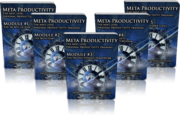

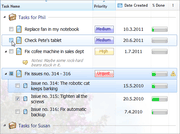
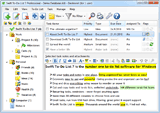
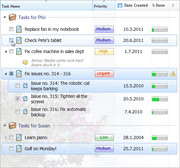
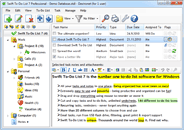

Pingback: New Swift To-Do List 7 Ultimate edition released – Dextronet.com Blog